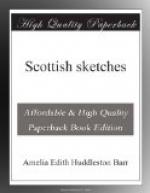“If this is making pictures, Colin, I’ll no say but what you could paint a sermon, my dear lad. I hae ne’er seen a picture before.” Then he turned to another, and his swarthy face glowed with an intense emotion. There was a sudden sense of tightening in his throat, and he put his hand up and slowly raised his hat. It was Prince Charlie entering Edinburgh. The handsome, unfortunate youth rode bareheaded amid the Gordons and the Murrays and a hundred Highland noblemen. The women had their children shoulder high to see him, the citizens, bonnets up, were pressing up to his bridle-rein. It stirred Tallisker like a peal of trumpets. With the tears streaming down his glowing face, he cried out,
“How daur ye, sir! You are just the warst rebel between the seas! King George ought to hang you up at Carlisle-gate. And this is painting! This is artist’s wark! And you choose your subjects wisely, Colin: it is a gift the angels might be proud o’.” He lingered long in the room, and when he left it, “Prince Charlie” and the “Clan’s Farewell” were his own. They were to go back with him to the manse at Crawford.
CHAPTER IX.
It was, upon the whole, a wonderful week to Tallisker; he returned home with the determination that the laird must recall his banished. He had tried to induce Colin to condone all past grievances, but Colin had, perhaps wisely, said that he could not go back upon a momentary impulse. The laird must know all, and accept him just as he was. He had once been requested not to come home unless he came prepared to enter into political life. He had refused the alternative then, and he should refuse it again. The laird must understand these things, or the quarrel would probably be renewed, perhaps aggravated.
And Tallisker thought that, in this respect, Colin was right. He would at any rate hide nothing from the laird, he should know all; and really he thought he ought to be very grateful that the “all” was so much better than might have been.
The laird was not glad. A son brought down to eat the husk of evil ways, poor, sick, suppliant, would have found a far readier welcome. He would gladly have gone to meet Colin, even while he was yet a great way off, only he wanted Colin to be weary and footsore and utterly dependent on his love. He heard with a grim silence Tallisker’s description of the house in Regent’s Place, with its flowers and books, its statues, pictures, and conservatory. When Tallisker told him of the condition of the Crawfords in Canada, he was greatly moved. He was interested and pleased with the Texan struggle. He knew nothing of Texas, had never heard of the country, but Mexicans, Spaniards, and the Inquisition were one in his mind.
“That at least was Crawford-like,” he said warmly, when told of Colin’s part in the struggle.
But the subsequent settlement of the clan there hurt him terribly. “He should hae told me. He shouldna hae minded what I said in such a case. I had a right to know. Colin has used me vera hardly about this. Has he not, Tallisker?”




